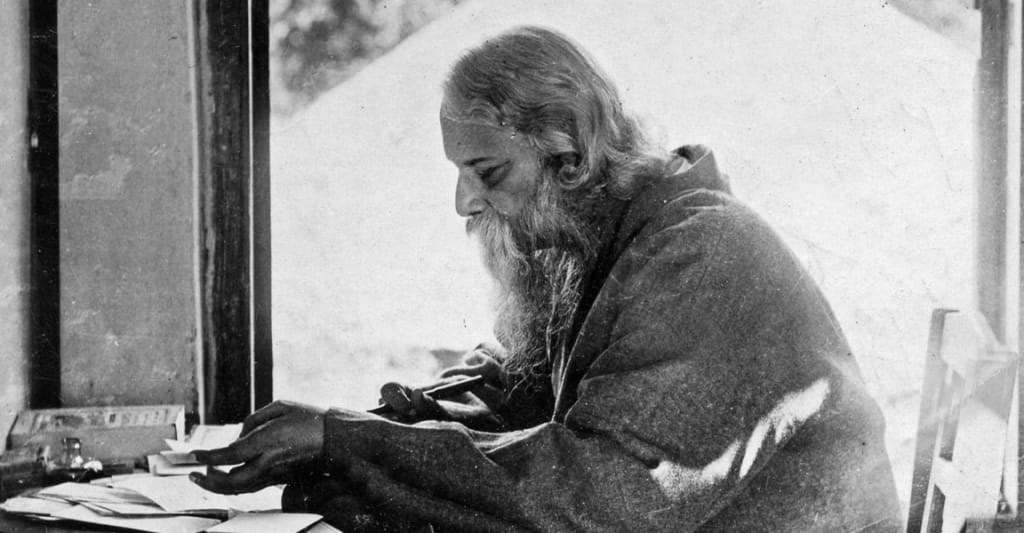
Hello, friends! Mostly, people know Rabindranath Tagore because he wrote our National Anthem. But do you know? He was the first Asian to win a Nobel prize. Apart from being a Nobel prize-winning author, he was a fine poet with an extensive collection of poems. He was also a music composer. He had composed more than 2,200 songs. He was also proficient in painting. There are more than 2,300 artworks to his name.
Additionally, he was an enthusiastic traveller. In his era, he had travelled to 34 countries. While it used to be so difficult to travel back then. What's more, he had contributed a great deal to the Indian Independence Movement. He was also a social reformer. At a time when most people were using the sense of Nationalism to fight against the Britishers, Rabindranath Tagore was a step ahead of them. He believed in the ideology of Internationalism.
Come, friends, let's get to know this great person in today's video. As always, let's start at the beginning. Rabindranath Tagore's family name or surname was Kushari. He was a Brahmin. And their family was so rich that they were called Thakur. But the Britishers couldn't pronounce the name. So they mispronounced it and started using Tagore. That's where he got his name, Tagore. And over time, 'Tagore' became commonly used. Now, Rabindranath Tagore's grandfather, Dwarkanath Tagore, he was a very prominent industrialist. He had several businesses in sectors like banking, insurance, coal- mining, and silk.
And if you remember the episode on Raja Ram Mohan Roy, I had told you, he was a close friend of Raja Ram Mohan Roy. And a member of his Brahmo Samaj. His son was Debendranath Tagore. Father of Rabindranath Tagore. The mindset of Debendranath Tagore was not very business-oriented. Rather he believed more in spirituality. In Swami Vivekananda's spiritual journey, he had played a huge role. I talked about it in the episode on Swami Vivekananda. Debendranath Tagore had 14 children. His youngest son was Rabindranath Tagore. He was born in 1861. Because Rabindranath Tagore's father was busy with his spiritual journey, and his mother wasn't healthy enough, he was mainly raised by servants in his childhood.
Later on, he describes this period of his life as it as a 'Servocracy.' Rule of the Servants. Talking about his education, he didn't have a good experience at school because he didn't pay much attention in his class. And so he'd often get punished by the teachers. That's why he kept changing schools. Calcutta Academy, Oriental Seminary, St Xavier's. Finally, he dropped out of school. After dropping out, he was home tutored by his brother Hemendranath Tagore. He was taught all the formal subjects like science, maths and such.
Other than these, he also got physical training. By way of judo, swimming in the Ganga, wrestling and even trekking. In fact, legendary musicians used to come to his home to teach him music. Like Jadunath Bhattacharya. He was the person who had composed the tune of Vande Mataram, our national song. In 1873, when Rabindra was 12 years old, his father took him on a journey of self-discovery. First in a small area of Shantiniketan. And then staying in Amritsar for a month. He'd sit in the Golden Temple for hours at an end listening to the Gurbani or sermons. Then they went to the Dalhousie hill station in the Himalayas to stay for some months. There his father taught him Astronomy, History and Modern Science. In addition to spiritual texts like Upanishads and Valimiki's Ramayana. Then he completed his higher education in London. Friends, we understand the craze for the IAS job today.
But did you know that Indian Civil Services began in 1855, London? And when it was opened up for Indians, it was very difficult for Indians to qualify for it. Primarily because the maximum age limit for attempting the exam was set at 23 years. And secondly, for the next 50 years, the exam was held in only London. So one had to go there to take the exam. On top of it, a big part of the syllabus was based on European Classics. So it was quite difficult for the Indians because of all these reasons. Even so, in 1864, Rabindranath's brother Satyendranath Tagore became the first Indian to pass this exam. Then in 1878, Rabindra went to England with his brother and his family to study abroad. He studied Law at the University College, London.
Because his father wanted him to be a lawyer. But he was not interested in law. So he dropped out of college later. Despite dropping out of the college, there is a Tagore lecture series taught in the college in Comparative Literature every year. During this time, Rabindra studied English Literature. Like the works of William Shakespeare. He also got acquainted with English, Irish and Scottish music. All these influences shaped the artworks of Rabindranath Tagore. He had started writing at a young age. He was only 13 when he wrote his first poem.
In 1874 it was published in the Tattwabodhini Patrika. At the time, these newspapers were the only ones to publish the works of Indian authors.
Rabindra also started writing and composing songs. And a huge fan of his songs was Naren. Who was Naren, you'd ask, our young Swami Vivekananda. In fact, Rabindranath Tagore, when he and Swami Vivekananda were young, had taught some songs to Naren. And Swami Vivekananda and some others had sung these songs at the wedding of a member of Brahmo Samaj. Just think about the deep connection these historical leaders shared. Rabindranath Tagore's music was a synthesize of several genres. Hindustani classical music, Carnatic music, Gurbani, Irish music, were mixed by him to create new music. To date, the impact is seen not only in Bengali music but many Bollywood songs are inspired by his music. Like the song Choo Kar Mere Mann Ko This song is inspired by his music. Talking about prose, Rabindra had started writing stories at a very young age. One of his most famous stories is The Kabuliwala. You might've read about it in some book. But he started writing novels at a later age. He published his first novel at the age of 22.
When he was comparatively older. 22 is very young. Rabindra wrote a collection of poems called Geetanjali. His poems were translated into English. And it gained so much fame in Europe and America that Rabindranath Tagore became a star. He started going on tours to various countries. He started getting invitations to give lectures. The child, who is decked with prince’s robes And who has jewelled chains round his neck loses all pleasure in his play; his dress hampers him at every step. In fear that it may be frayed, or stained with dust he keeps himself from the world, and is afraid even to move. Mother, it is no gain, thy bondage of finery, if it keep one shut off from the healthful dust of the earth, if it rob one of the right of entrance to the great fair of common human life.” Rabindranath Tagore's poems often revolved around the themes of independence, freedom and patriotism. Perhaps his most famous poem is Into that heaven of freedom, my Father, Let My Country Awake.
When the Britishers partitioned Bengal in 1905, then he wrote the song, Āmār Shonār Bānglā. Which is now the National Anthem of Bangladesh. Rabindranath Tagore has not only written the National Anthem of India, but also the National Anthem of Bangladesh. He had requested the Hindus and Muslims to tie Rakhi (a symbol of brotherhood) on Rakshabandhan (day celebrating brotherhood) to show their unity. Around this time, he wrote one of his most famous songs. Eklā Cholo Re. If you're the only one fighting injustice, Carry on with the fight Even if you have to do it alone. When he wrote or National Anthem Jana Gana Mana it was sung for the first time in 1911 in the Congress Session in Calcutta.
After this, in 1913, he became the first non-European to win a Nobel Prize. He won the Nobel Prize in the field of Literature. Who can say friends, the next Nobel Prize may also be won by an Indian. There are more than 600,000 writers on Pratilipi. So there is a lot of diversity of content there. Someone among these 600,000 authors may be the next winner in the field of literature. The British government respected him a lot. That's why in 1915, the British Government conferred a Knighthood on him. It was a matter of much pride.
Four years later, in 1919 the Jallianwala Bagh massacre happened. Because of it, he renounced or gave up his Knighthood, as a form of protest. The opinions of Mahatma Gandhi and Rabindranath Tagore varied a lot over several issues. At times there had almost contrasting opinions. Gandhi believed in Nationalism. He believed that we should of course love the country we're born into. And the sense of Nationalism helps to unite people against the British rule. But Rabindranath Tagore believed that the sense of nationalism can soon turn into vain pride. That people start believing their country to be the best. And start hating other countries for no reason at all. We're told that Asia is like a magnificent tomb. That looks for its riches among its dead. It is said that Asia cannot progress, Because it is always looking at the past. We have accepted this accusation. We started believing it.
We forgot that Philosophy, Science, Art, Literature and Religion, all emanated from Asia. It is not true that the air and soil here make people lazy and hinder all progress. When the West was in darkness, it was the East that carried the torch of civilizations for centuries. And then the dark night set on the East. Asia stopped looking for new food. And began surviving on its past. This indolence is like Death. So basically, Rabindranath Tagore's ideology was one step above Nationalism. He believed in Internationalism. The entire world is one. We shouldn't hate on other cultures and other countries without any reason. It is quite similar to Bhagat Singh's ideology. I told this in the episode on Bhagat Singh that Bhagat Singh too believed in Internationalism. But interestingly friends, despite the difference of opinion, Rabindranath Tagore and Mahatma Gandhi were good friends. And they had helped one another when needed. In 1932, when Gandhi went on a hunger strike in Pune Tagore went to help him.
On another occasion, when Gandhi saw Tagore performing in plays he began to worry about Tagore's health because he was quite old by then. Gandhi asked Tagore why he wanted to perform. Tagore answered that he was raising funds for his university. So Mahatma Gandhi asked one of his rich friends to donate money to the university. Look at these famous photos of Rabindranath with Jawaharlal Nehru, Mahatma Gandhi, and with Subhash Chandra Bose. Rabindranath Tagore gave the title of Desh Nayak (Country's Hero) to Subhash Chandra Bose in 1939. And had written an essay praising him.
What were the exact ideologies of Rabindranath Tagore? And what were his reasonings for those ideologies? For his way of thinking? Let's talk about it in some other video. I think it's enough for today. But it is fascinating to know how his ideology contrasted with those of Subash Chandra Bose and Mahatma Gandhi. And where they had similar opinions.






Comments
There are no comments for this story
Be the first to respond and start the conversation.